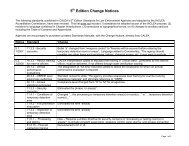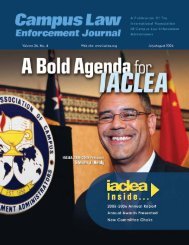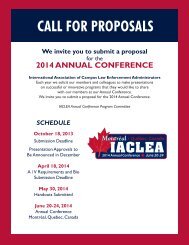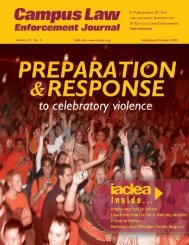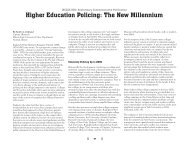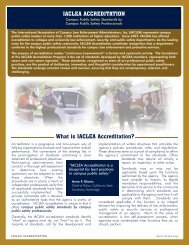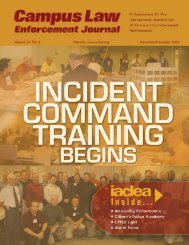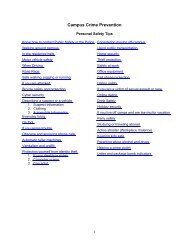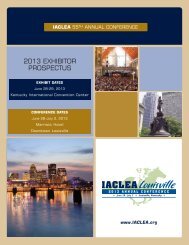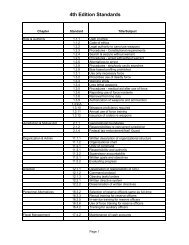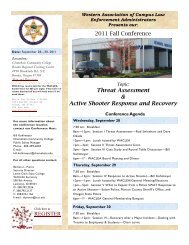Volume 36, No. 5 - September/October 2006 Campus Law ... - IACLEA
Volume 36, No. 5 - September/October 2006 Campus Law ... - IACLEA
Volume 36, No. 5 - September/October 2006 Campus Law ... - IACLEA
Create successful ePaper yourself
Turn your PDF publications into a flip-book with our unique Google optimized e-Paper software.
Addressing the Frustrations of <strong>Campus</strong> Police Chiefs and Directors<br />
Continued from page 7<br />
“Other chiefs/directors” is associated<br />
with sworn chiefs vs. non-sworn, more<br />
sworn officers and higher salary.<br />
“What are the most helpful training/<br />
education programs you’ve attended?”<br />
63% Educational degree<br />
programs.<br />
40% State or regional higher ed<br />
or campus public safety<br />
conference.<br />
35% <strong>IACLEA</strong> annual conference.<br />
The “<strong>IACLEA</strong> annual conference”<br />
choice is associated with higher education,<br />
and more years as chief/director<br />
(newer chiefs/directors attend less).<br />
“The main things your boss could do<br />
to assist you more in your job”:<br />
55% <strong>No</strong>t much; great boss, gives<br />
me freedom and support.<br />
45% Could provide more budget<br />
resources.<br />
25% Could give higher priority<br />
to crime and safety<br />
concerns over other campus<br />
operational issues.<br />
“The main things your law enforcement<br />
employees could do to assist you<br />
more in your job”:<br />
62% Appreciate the “big picture”<br />
in the importance of<br />
serving the campus with<br />
respect and courtesy, and<br />
of working with students<br />
and employees to solve<br />
problems.<br />
40% Communicate more positively;<br />
give constructive<br />
feedback, stop rumors and<br />
speak up openly and<br />
honestly on issues.<br />
39% Do their jobs professionally<br />
and take responsibility for<br />
their actions.<br />
As chiefs and directors, they enjoy<br />
improving their departments, having a<br />
positive impact on employees, helping<br />
people with problems and interacting with<br />
students, citizens and community leaders.<br />
“What do you do for yourself to deal<br />
with stress and pressure?”<br />
59% Spend quality time with<br />
spouse, family, significant<br />
other.<br />
45% Individual exercise<br />
(walking, jogging, weights,<br />
swimming).<br />
42% Enjoy time alone, slow<br />
down, enjoy quiet time,<br />
reflect, unwind.<br />
32% Travel, vacation, enjoy a<br />
change of scenery.<br />
31% Relaxing, enjoyable<br />
activities (non-active):<br />
reading, TV, movies, music,<br />
computer games.<br />
23% Rely on spiritual faith, pray,<br />
go to church, bring my<br />
concerns to God.<br />
19% Seek out comedy, a sense<br />
of humor, ways to laugh.<br />
“Ways you problem-solve on major<br />
‘crisis’ issues”:<br />
73% Brainstorm and consult with<br />
top command staff/team<br />
and those trusted employees<br />
closest to the problem.<br />
57% Personally examine the<br />
problem and its history,<br />
gather information, consider<br />
all options and make the<br />
best decision.<br />
55% Always start by asking<br />
myself, ‘What’s the right<br />
(vs. expedient) thing to do?’<br />
“Right thing to do” choice is associated<br />
with sworn chiefs vs. non-sworn.<br />
“Ways you develop support and expertise<br />
in your top managers”:<br />
71% Communicate regularly and<br />
openly with them.<br />
66% Lead by example, provide<br />
an open and honest administration,<br />
treat others with<br />
respect.<br />
61% Clearly delegate authority,<br />
empower and involve them.<br />
“If you were to leave your present job<br />
for any reason, what kind of job would<br />
you most likely take?”<br />
31% Another chief/director<br />
position.<br />
21% Teaching, at the college,<br />
community college or K-12<br />
level.<br />
16% Consulting, training or other<br />
job in the law enforcement<br />
field.<br />
“Another chief/director position” is associated<br />
with sworn c<br />
hiefs vs. non-sworn, higher education,<br />
fewer years as chief/director.<br />
“What do you look forward to most<br />
about your eventual retirement?”<br />
26% Spending more time and<br />
attention with spouse,<br />
family, significant other.<br />
22% Getting away from the<br />
constant stress of personnel<br />
management and top<br />
responsibility.<br />
21% Enjoying relaxing leisure<br />
activities, including golf,<br />
reading, fishing, horseback<br />
riding.<br />
“What changes would you make in your<br />
job, if given the authority, to make your<br />
chief/director job more satisfying and productive?<br />
53% Better pay and other job<br />
compensation.<br />
28% More opportunities to do<br />
other things within the<br />
university, such as teaching.<br />
25% More freedom and authority<br />
to run the department<br />
without unwarranted<br />
interference.<br />
The “better pay” selection is associated<br />
with lower education, lower salary,<br />
smaller colleges and fewer sworn officers.<br />
Advice to a New Police Chief/<br />
Director<br />
The top ten suggestions for advice to a<br />
new chief/director, starting with the most<br />
frequently mentioned, are as follows:<br />
Continued on page 9<br />
8 / <strong>Campus</strong> <strong>Law</strong> Enforcement Journal




